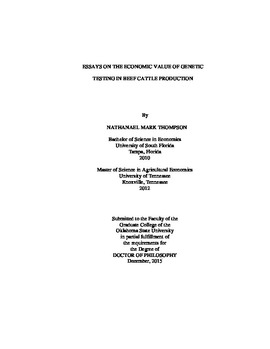| dc.contributor.advisor | Epplin, Francis M. | |
| dc.contributor.author | Thompson, Nathanael Mark | |
| dc.date.accessioned | 2016-09-29T18:46:38Z | |
| dc.date.available | 2016-09-29T18:46:38Z | |
| dc.date.issued | 2015-12 | |
| dc.identifier.uri | https://hdl.handle.net/11244/45382 | |
| dc.description.abstract | Recent advancements in genomic technology have made genetic marker panels for a variety of economically-relevant beef cattle traits commercially available. Although independent validations have found that many of these markers are correlated with the traits they are designed to predict, economists have considered few of these markers and their value to producers. The objective of this dissertation is to contribute to the understanding of the economic value of these markers. | |
| dc.description.abstract | The first essay estimates the value of using information from genetic marker panels characterizing seven economically-relevant traits for management and selection of feedlot cattle. The values of using genetic information to sort cattle by optimal days-on-feed are less than $1/head for each of the traits evaluated, and the values associated with using genetic information to select cattle for placement are as much as $38/head. Therefore, it would not be profitable at the current cost of testing (about $40/head) to sort cattle by optimal days-on-feed, but it could be profitable to use the genetic tests for breeding cattle selection. | |
| dc.description.abstract | The second essay examines the potential to increase the value of genetic information by improving fed cattle marketing decisions. The value of using genetic information to selectively market cattle ranges from $1-$13/head depending on how a producer currently markets their cattle and the grid structure. Although these values are generally higher than those reported in previous research, they are still not enough to offset the current cost of genetic testing. | |
| dc.description.abstract | The third essay evaluates the potential for reducing the overall cost of genetic testing by assuming that, instead of testing each individual animal, a random sample of animals could be tested to measure the genetic potential of the group. Using a fully Bayesian approach, we determine that an optimal sample size of 10 out of 100 animals generated returns from sampling of nearly $10/head. Although sensitivity analysis suggests that these values will vary depending on the particular pen of cattle, results indicate that random sampling has the potential to provide a context in which the benefits of genetic testing outweigh the costs. | |
| dc.format | application/pdf | |
| dc.language | en_US | |
| dc.rights | Copyright is held by the author who has granted the Oklahoma State University Library the non-exclusive right to share this material in its institutional repository. Contact Digital Library Services at lib-dls@okstate.edu or 405-744-9161 for the permission policy on the use, reproduction or distribution of this material. | |
| dc.title | Essays on the economic value of genetic testing in beef cattle production | |
| dc.contributor.committeeMember | Brorsen, B. Wade | |
| dc.contributor.committeeMember | Devuyst, Eric Allen | |
| dc.contributor.committeeMember | Lusk, Jayson | |
| dc.contributor.committeeMember | Rolf, Megan M. | |
| osu.filename | Thompson_okstate_0664D_14315.pdf | |
| osu.accesstype | Open Access | |
| dc.type.genre | Dissertation | |
| dc.type.material | Text | |
| thesis.degree.discipline | Agricultural Economics | |
| thesis.degree.grantor | Oklahoma State University | |
